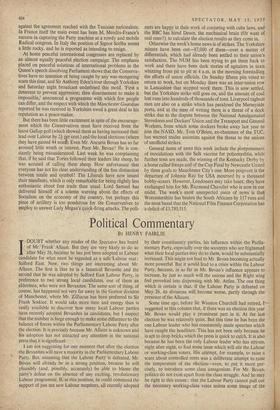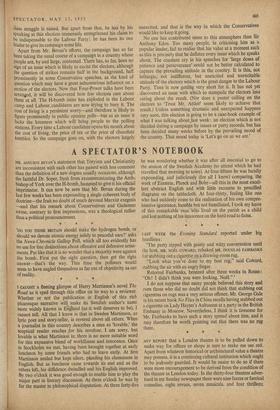Political Commentary
BY HENRY FAIRLIE IDOUBT whether any reader of the Spectator \has heard of Mr. Frank Allaun. But they are very likely to do so after May 26, because he has just been adopted as Labour candidate for what must be regarded as a safe Labour seat : Salford East. Now, two things are interesting about Mr. Allaun. The first is that he is a fanatical Bevanite and the second that he was adopted by Salford East Labour Party, in preference to two strong local candidates, one of them an alderman, who were not Bevanites. The same sort of thing, of preference to two strong local candidates, one of them an alderman, who were not Bevanites. The same sort of thing, of course, has happened not very far away in the Gorton division of Manchester, where Mr. Zilliacus has been preferred to Sir Frank Soskice. It would take more time and energy than is easily available to discover how many local Labour parties have recently adopted Bevanites as candidates, but I suspect that the number is large enough to make some difference to the balance of forces within the Parliamentary Labour Party after the election. It is precisely because Mr. Allaun is unknown and his adoption has not attracted any attention in the national press that it is significant.
I am not suggesting for one moment that after the election the Bevanites will have a majority in the Parliamentary Labour Party. But, assuming that the Labour Party is defeated, Mr. Bevan will already be in a strong position, because he will plausibly (and, possibly. accurately) be able to blame the party's defeat on the absence of any exciting, revolutionary Labour programme. If, in this position, he could command the support of just ten new Labour members, all recently adopted by their constituency parties, his influence within the Parlia- mentary Party, especially over the waverers who are frightened what their local parties may do to them, would be substantially increased. This might not lead to Mr. Bevan becoming actually more powerful. But it would lead to a crisis within the Labour Party, because, in so fur as Mr. Bevan's influence appears to increase, by just so much will the unions and the Right wing feel provoked into dispensing with Mr. Attlee. The one thing which is certain is that, if the Labour Party is defeated on May 26, its divisions will become worse, partly through the presence of the Alla uns.
Some time ago, before Sir Winston Churchill had retired, I— suggested in this column that, if there was an election this year Mr. Bevan would play a prominent part in it. At the last election he was relatively quiet. But this time he has been the one Labour leader who has consistently made speeches which have caught the headlines. This has not been only because he is apt to drop bricks which the press is quick to catch. It is also because he has been the only Labour leader who has striven. night after night, to find some issue which will stir the Labour or working-class voters. His attempt, for example, to raise a scare about controlled rents was a deliberate attempt to raise the temperature of the election—even, to put it more pre- cisely, to introduce some class antagonism. For Mr. Bevan, politics do not exist apart from the class struggle. And he may be right to this extent : that the Labour Party cannot pull out the necessary working-class votes unless some image of the class struggle is raised. But apart from that, he has by his speaking at this election immensely strengthened his claim to be indispensable to the Labour Party : he has been its one leader to give its campaign some life. Apart from Mr. Bevan's efforts, the campaign has so far been taking the usual course of a campaign in a country whose People are, by and large. contented. There has, so far, been no sign of an issue which is likely to excite the electors, although the question of strikes remains half in the background, half prominently in some Conservative speeches, as the kind of question which may have a great subconscious influence on a section of the electors. Now that Four-Power talks have been arranged, it will be discovered how few electors care about them at all. The H-bomb issue has exploded in the Labour camp and Labour.candidates are now trying to bury it. The Cost of living is a persistent worry—and therefore is likely to figure prominently in public opinion polls—but as an issue it lacks the keenness which will bring people to the polling stations. Every time a Labour candidate opens his mouth about the cost of living, the price of tea or the price of chocolate tumbles. So the campaign goes on, with the electors largely unexcited, and that is the way in which the Conservatives would like to keep it going. No one has contributed more to this atmosphere than Sir Anthony Eden. Too many people, in criticising him as a popular leader, fail to realise that his value at a moment such as this is precisely that he deflates every issue which he speaks about. The constant cry in his speeches for 'large doses of patience and perseverance' could not be better calculated .to capture the prevailing attitude in the country. It is this, not lethargic. not indifferent, but unexcited and unexcitable attitude of the electors which is the great danger to the Labour Party. Time is now getting very short for it. It has not yet discovered an issue with which to stampede the electors into caring about the result. (Nor does a poster calling on the electors to 'Trust Mr. Attlee' seem likely to achieve that result.) Unless something dramatic and unexpected happens very soon, this election is going to be a case-book example of what I was talking about)ast week: an election which is not decided during a campaign by issues or party records, but has been decided many weeks before by the prevailing mood of the country. That mood today is 'Let's go on as we are.'



































 Previous page
Previous page